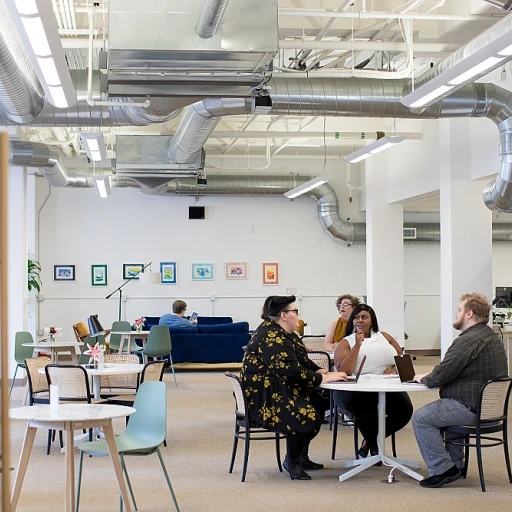
Understanding Employee Success
Redefining Employee Success through Strategic Frameworks
Employee success is a multifaceted concept that intertwines several crucial elements, including engagement, work-life balance, effective communication, and recognition. The essence of employee success goes beyond mere performance metrics; it encompasses an environment where employees feel valued, appreciated, and aligned with their organization's goals. For managers and leaders, the challenge lies in creating a framework that supports this success throughout the employee lifecycle.
To achieve employee success, companies must adopt comprehensive performance management strategies. These strategies focus on individuals' strengths, fostering a culture of feedback and recognition that motivates and engages team members. Moreover, understanding what drives employee engagement performance is pivotal in creating impactful interventions.
Organizations committed to unlocking employee success invest time in understanding the unique needs of their workforce. This involves recognizing the significance of work-life balance and integrating it into the organizational culture. Additionally, evaluating employee development through innovative technologies can provide personalized growth opportunities and nurture a more engaged and effective team.
Engagement and recognition not only propel employee success but also contribute to a better employee experience, eventually reflecting on improved customer service. An engaged employee is empowered to exceed expectations, thereby driving organizational success.
The Role of Technology in Employee Success
Technological Advancements in Facilitating Employee Success
The integration of technology in the workplace has become a transformative force in enhancing employee engagement and overall performance. With innovations rapidly evolving, both leaders and team members need to comprehend its impact on the work environment. Organizations are increasingly leveraging technology to enhance the employee experience and boost engagement performance.
Modern tools and platforms facilitate effective communication and foster collaboration among teams, regardless of their geographical location. Remote employees, for instance, can now easily stay connected with their peers, thus maintaining the sense of belonging instrumental in ensuring engaged employees.
- Performance Management Systems: These tools offer managers and employees the capability to track and measure performance efficiently. They ensure continuous feedback and provide metrics that help define and recognize success employee efforts.
- Flexible Work Solutions: Technology provides flexible work arrangements that contribute to a healthier work-life balance. This adaptability assists employees in managing their administrative customer responsibilities while still excelling in their roles.
- Learning Platforms: Personalized learning resources enable employees to pursue professional development at their own pace. This empowerment leads to increased satisfaction and performance.
Technology also assists managers and leaders in recognizing drivers of employee success. By utilizing analytical tools, they can pinpoint areas that need improvement, ensuring feedback and recognition are both timely and effective. In this way, companies enhance their performance reviews and adapt strategies that support life balance and foster a culture of positivity and growth.
Evidence points to organizations successfully implementing these solutions experiencing higher levels of employee appreciation, ultimately leading to better customer service. The right technological tools can make employees feel valued and supported, which is crucial for sustaining competitive success in any organization.
Innovative HR Practices for Employee Engagement
Driving Employee Engagement Through Innovative HR Practices
Employee engagement is a critical component of enhancing performance and overall productivity within any company. In today's rapidly evolving workplaces, innovative Human Resource (HR) practices are essential to foster a stimulating and supportive environment that keeps team members engaged and committed to the organization's goals. Here's how organizations can unlock employee success and transform their HR strategies:
- Implementing Effective Communication Tools: To engage employees, organizations must establish effective communication channels. This involves leveraging technology that allows seamless interaction and collaboration between managers and their teams. These tools not only enhance communication but also allow for timely feedback and recognition.
- Encouraging Collaborative Work: Facilitating teamwork is crucial for employee engagement. By using project management software and collaborative platforms, companies can enable teams to work together more efficiently, regardless of their work location, enhancing the overall employee experience.
- Pioneering Flexible Work Arrangements: Work life balance is a key driver of employee satisfaction and engagement. Offering remote work opportunities, flexible hours, and personalized job roles can lead to more engaged employees who value the flexibility and trust given by their organization.
- Cultivating a Culture of Feedback and Recognition: Recognizing employees' accomplishments and providing regular feedback can significantly boost morale and engagement levels. Managers are encouraged to celebrate small wins and achievements, reinforcing a culture that values and appreciates its employees.
- Integrating Employee Wellness Programs: Prioritizing employees' physical, mental, and emotional well-being by introducing comprehensive wellness programs can elevate organizational culture and enhance engagement.
These innovative HR initiatives are integral in creating a dynamic environment where employees feel valued and aspired to give their best performance. By focusing on these strategies, companies can increase their employee engagement performance, leading to sustained success employee satisfaction and customer service solutions. For more insights on engaging talent through innovative activities, visit this resource.
Personalized Learning and Development
Personalized Growth Pathways
To truly unlock the potential of employees within an organization, personalized learning and development opportunities play a critical role. These tailored growth pathways allow team members to develop skills and competencies at their own pace, fostering a deeper engagement and a sense of ownership over their career trajectories. This personalized approach equips employees to tackle their roles with more confidence and effectiveness, thereby boosting their overall performance and contribution to the company's goals.
Key to achieving this is understanding the unique strengths and weaknesses of each individual within the team. Managers and leaders can implement various assessment tools to pinpoint these areas, enabling more effective communication and targeted development plans. The result is engaged, empowered employees ready to deliver exceptional work.
Leveraging Technology for Training
In this digital age, technology proves to be an invaluable asset in creating personalized development experiences. Learning management systems, e-learning platforms, and virtual coaching can help employees gain new knowledge and skills anytime, anywhere. This flexibility supports a healthy work-life balance, allowing employees to pursue growth without sacrificing other life commitments.
By capitalizing on digital resources, organizations can foster a culture where continuous learning and adaptation are standard practice, resulting in a more competent, engaged workforce ready to meet the challenges of a dynamic business environment.
Encouraging a Culture of Support
While technology plays a significant role, the human element remains pivotal. Managers and leaders should foster an environment that encourages employees to seek feedback and take risks in their learning journey. Creating a supportive atmosphere where team members feel appreciated and safe to explore new ideas can significantly enhance employee engagement and performance.
Innovative HR practices should focus on blending technological solutions with human-centric approaches to create a balanced and effective development strategy that drives both individual and organizational success.













